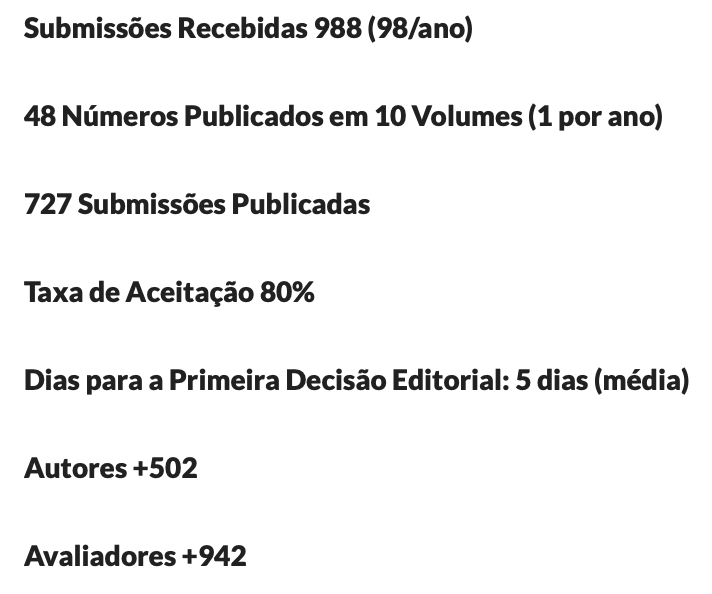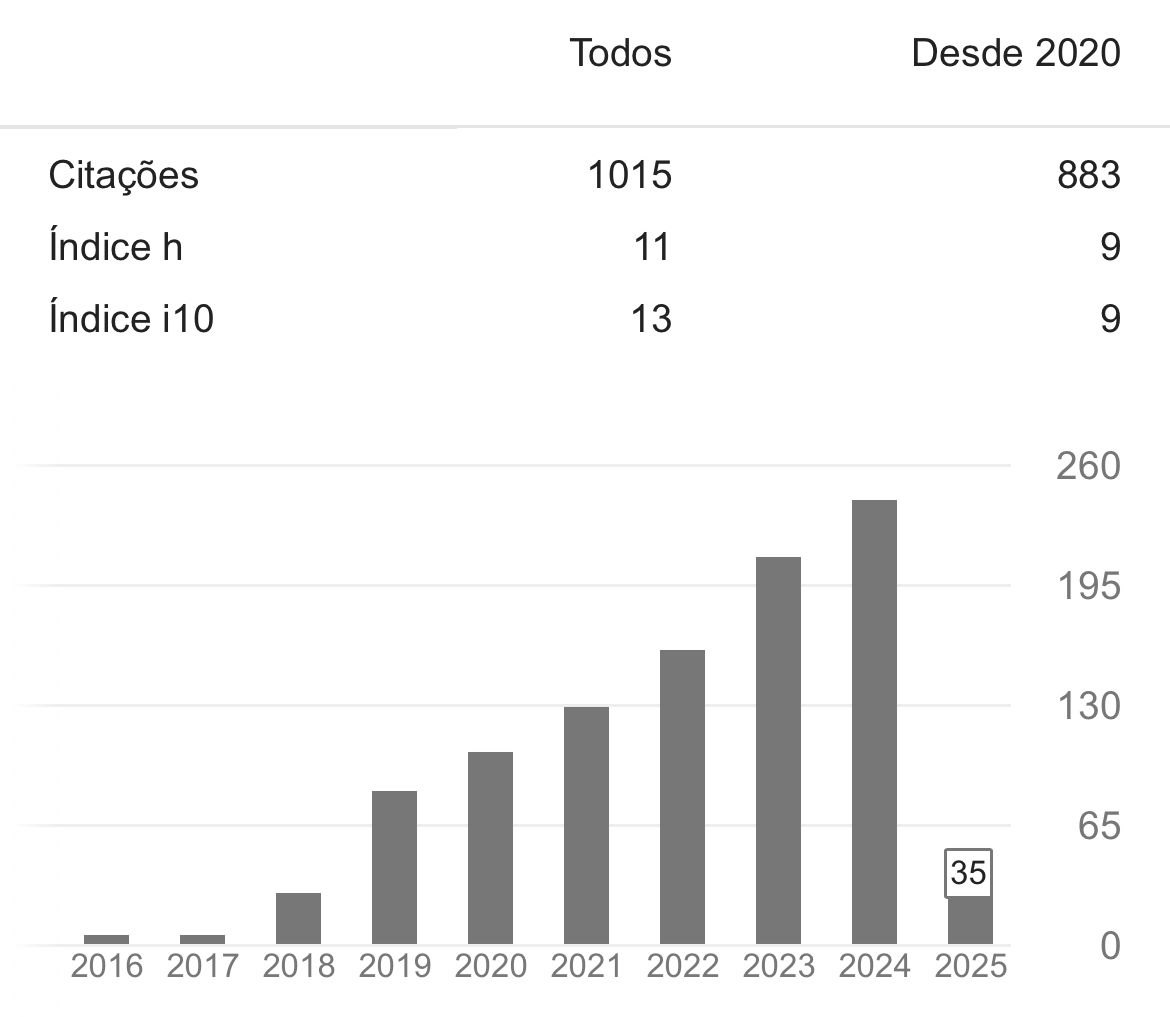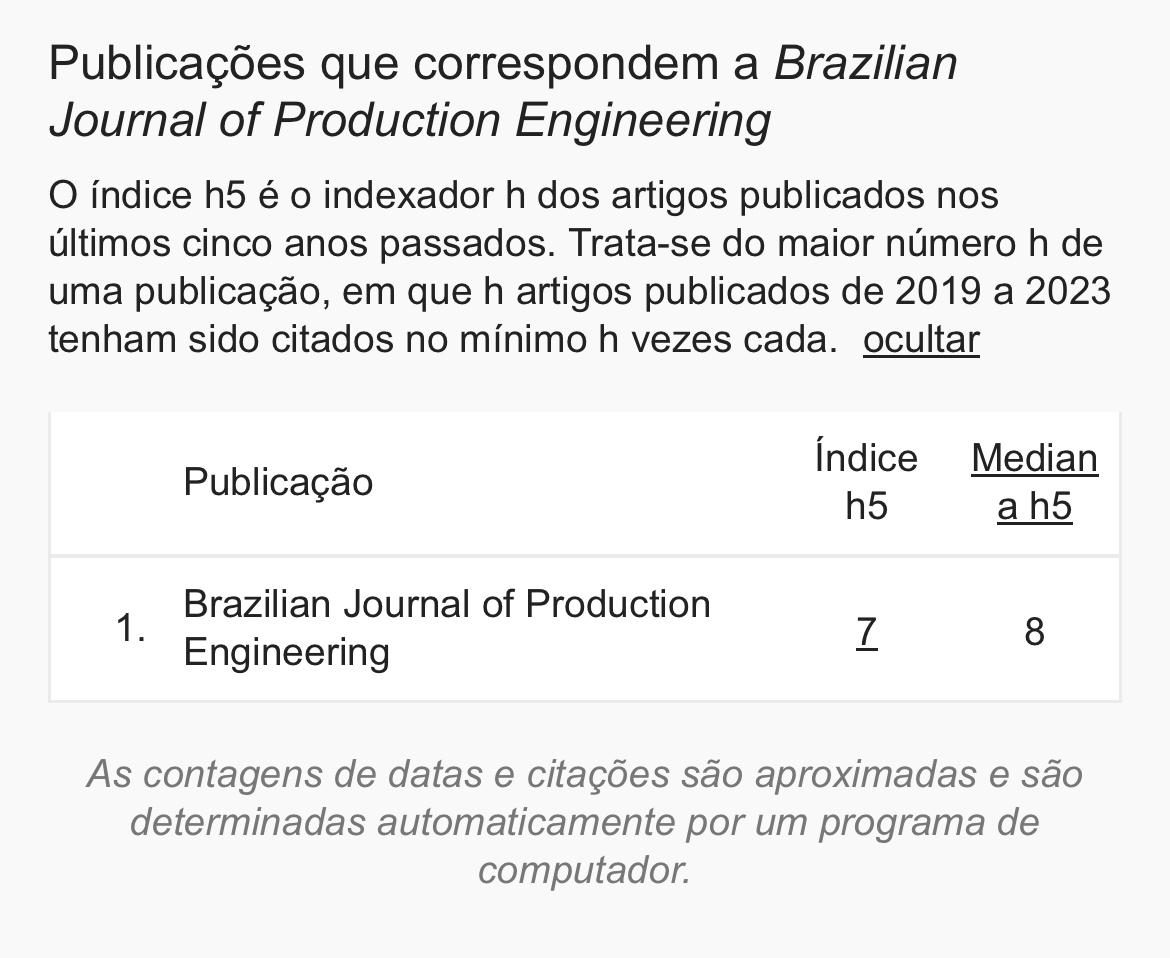Implementación de una cultura de manufactura esbelta en el sector de equipos de generación de energía: un análisis comparativo entre la teoría y la práctica
DOI:
https://doi.org/10.47456/bjpe.v8i1.36826Palabras clave:
Lean, Energia, ProduçãoResumen
La manufactura esbelta es una de las principales filosofías aplicadas para aumentar la productividad debido al gran éxito de Toyota y la posterior gran expansión de la industria automotriz. Esta cultura de mejora continua ha sido estudiada por varios autores y desglosada en pasos de una metodología de implementación y control, sin embargo, varios estudios apuntan a una tasa de fracaso muy alta en la replicación. El objetivo magro. El objetivo de este estudio fue la implementación de la filosofía lean en el sector de fabricación de componentes para la generación de energía renovable, con el fin de comparar los desafíos de implementación y los procesos realizados con la literatura clásica sobre el tema. La metodología de estudio se aplicó a través de un estudio de caso con recolección de datos a través de entrevistas semiestructuradas a un grupo de expertos de una empresa del sector de las energías renovables, siendo además comparativa con la literatura lean. Como resultado, se encontraron tres procesos principales que constituyen la implementación de lean en este sector: Hoshin Kanri, Value Stream Mapping y Kaizen Events. Luego se compararon con la literatura para identificar diferencias y a partir de esta comparación se realizaron sugerencias de mejoras para la implementación de estos tres procesos en la empresa objeto de estudio.
Descargas
Citas
Callefi, J. & Crubellate, J. M. (2020). O Sistema Toyota de Produção: institucionalismo comunicativo e a cultura organizacional. Revista Gestão & Tecnologia. 20(1), 209-229. https://doi.org/10.20397/2177-6652/2020.v20i1.1599
Dennis, P. (2008). Produção Lean Simplificada: Um guia para entender o sistema de produção mais poderoso do mundo (2a ed). Porto Alegre: Bookman.
Fachin, O. (2006). Fundamentos de metodologia (5a ed). São Paulo: Saraiva.
Gabriel, M.L. (2014). Métodos Quantitativos em Ciências Sociais: Sugestões para Elaboração do Relatório de Pesquisa. Desenvolvimento Em Questão, 12(28), 348-369. https://doi.org/10.21527/2237-6453.2014.28.348-369
Gerhardt, T. E. & Souza, A. C. (2009). Métodos de Pesquisa (pp. 11-25) (1a ed). Porto Alegre: Editora da UFRGS.
Gil, A. C. (2002). Como elaborar projetos de pesquisa (4a ed). São Paulo: Atlas.
Gross, J. M. & McInnis, K. R. (2003). Kanban Made Simple: Demystifying and Applying Toyota's Legendary Manufacturing Process (1a ed). Nova Iorque: AMACOM.
Koenigsaecker, G. (2011). Liderando a transformação Lean nas empresas (1a ed). Porto Alegre: Bookman.
LaHote, D. (2015). What strategy is and what it's not. Lean Institute Brasil. Recuperado de https://www.lean.org/leanpost/Posting.cfm?LeanPostId=357
Liker, J.K. (2005). O Modelo Toyota: 14 princípios de gestão do maior fabricante do mundo. (1a ed). Porto Alegre: Bookman.
Liker, J. K. & Convis, G. L (2013). O modelo Toyota de liderança Lean: Como conquistar e manter a excelência pelo desenvolvimento de lideranças (1a ed). Porto Alegre: Bookman.
Miguel, P. A. C. (2007). Estudo de caso na engenharia de produção: estruturação e recomendações para sua condução. Production. 17(1), 216–229. https://doi.org/10.1590/S0103-65132007000100015
Minayo, M. C. de S., Deslandes, S. F., Neto, O. C., & Gomes, R. (2002). Pesquisa social: Teoria, método e criatividade (21a ed). Petrópolis: Vozes.
Paro, P. E. P. (2016). Sistemática de transformação: desenvolvimento teórico para o alinhamento entre estratégia e cultura organizacional nos projetos de Lean (Dissertação de Mestrado). Universidade de São Paulo, São Carlos, SP, Brasil. Recuperado de https://www.teses.usp.br/teses/disponiveis/18/18156/tde-05072016-102816/pt-br.php
Pires, J. C. S. & Macedo, K. B. (2006). Cultura organizacional em organizações públicas no Brasil. RAP, 40(1), 81-105. https://doi.org/10.1590/S0034-76122006000100005
Raupp, F. M. & Beuren, I. M. (2008). Como elaborar trabalhos monográficos em Contabilidade. (pp. 76-97). (3a ed). São Paulo: Atlas.
Rother, M. (2010). Toyota Kata: Gerenciando pessoas para melhoria, adaptabilidade e resultados excepcionais (1a ed). Porto Alegre: Bookman.
Rother, M. & Shook, J. (2013). Aprendendo a enxergar: Mapeando o fluxo de valor para agregar valor e eliminar o desperdício (1a ed). São Paulo: Lean Institute Brasil.
Schein, E. H. (1984) Coming to a new awareness of organizational culture. MIT, Sloan Management Review. Recuperado de https://sloanreview.mit.edu/article/coming-to-a-new-awareness-of-organizational-culture
Werkema, C. (2003). Criando uma cultura Lean Seis Sigma (3a ed). Rio de Janeiro: Elsevier.
Womack, J. P. & Jones, D. T. (2003). Lean Thinking: Banish waste and create wealth in your Corporation. (2a ed). Nova Iorque: Free Press.
Zanella, L. C. H. (2011). Metodologia de Pesquisa (2a ed). Departamento de Ciências da Administração, Universidade Federal de Santa Catarina, Florianópolis, SC, Brasil. Recuperado de http://arquivos.eadadm.ufsc.br/EaDADM/UAB_2014_2/Modulo_1/Metodologia/material_didatico/Livro%20texto%20Metodologia%20da%20Pesquisa.pdf
Descargas
Publicado
Cómo citar
Número
Sección
Licencia
Derechos de autor 2022 Brazilian Journal of Production Engineering - BJPE

Esta obra está bajo una licencia internacional Creative Commons Atribución-NoComercial-CompartirIgual 4.0.

















































































